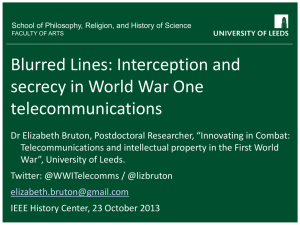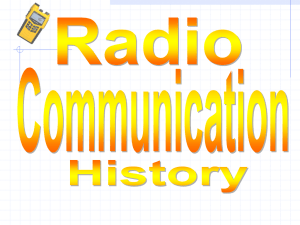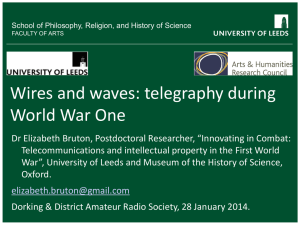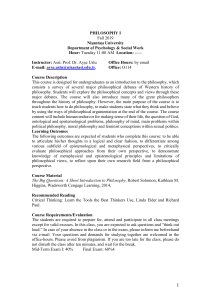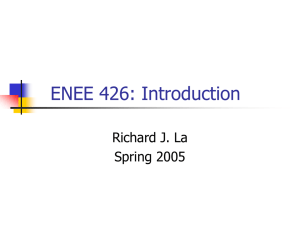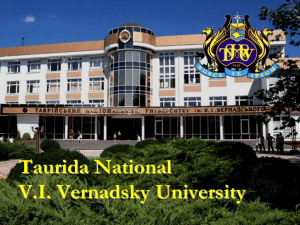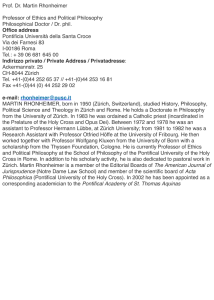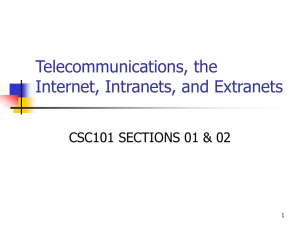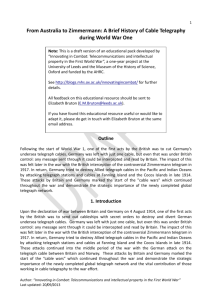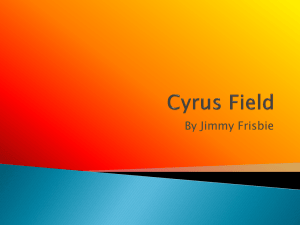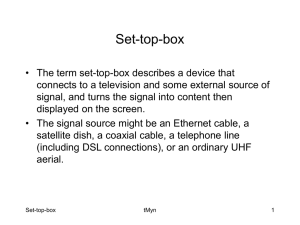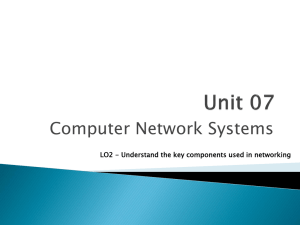PowerPoint slides from evening lecture
advertisement
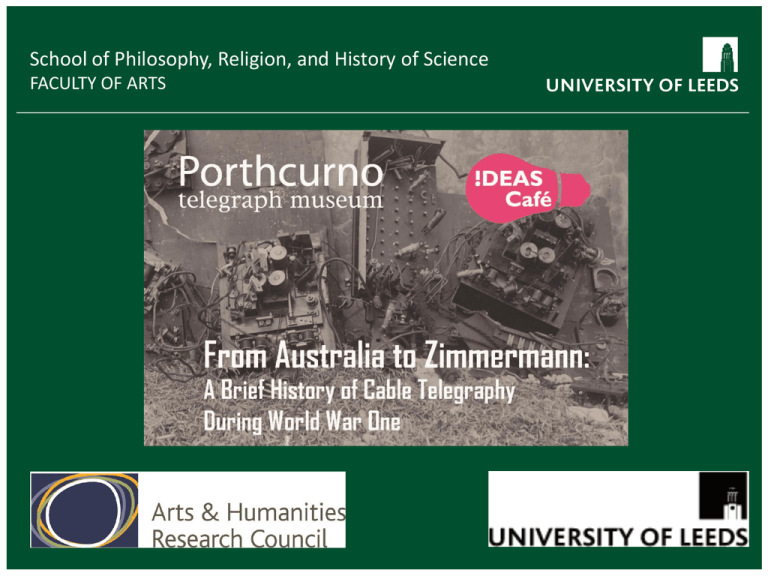
School of Philosophy, Religion, and History of Science School of something FACULTY OF OTHER ARTS FACULTY OF School of Philosophy, Religion, and History of Science FACULTY OF ARTS Innovating in Combat • Elizabeth Bruton, Postdoctoral Researcher, “Innovating in Combat: Telecommunications and intellectual property in the First World War” • Aim of the project is to help museums, archives, and the wider public to better appreciate the significance of communications technologies during World War One • University of Leeds and Museum of the History of Science, Oxford • Graeme Gooday and Elizabeth Bruton • Funded by AHRC School of Philosophy, Religion, and History of Science FACULTY OF ARTS Outline • Introduction • Cable Telegraphy prior to World War One • Outbreak of War and “Cable Wars” – cutting of cables • Britain cuts international cables including Borkum • German attack on Fanning Island • German attack on Cocos Islands • German attack on Britain-Norwegian cable • Zimmermann Telegram • Conclusion Cover of Horatio Alger, Jr.'s The Telegraph Boy, c.1880. Image available in the public domain via Wikimedia Commons. School of Philosophy, Religion, and History of Science FACULTY OF ARTS Electrical Telegraphy Left: William Fothergill Cooke and Charles Wheatstone's electric telegraph "needle telegraph") from 1837 now in the Science Museum. Image licensed by GNU license Via Wikimedia Commons. Right: Morse key, by Ken Owen. Image licensed via Creative Commons Attribution-NonCommercial-NoDerivs 2.0 School of Philosophy, Religion, and History of Science FACULTY OF ARTS Cable Telegraphy 1891 Telegraph Cable map. Image available in public domain. School of Philosophy, Religion, and History of Science FACULTY OF ARTS Cable Telegraphy Map of the Submarine Telegraph between America and Europe. Image available in the public domain. School of Philosophy, Religion, and History of Science FACULTY OF ARTS Outbreak of War Left: Segment of Borkum cable. Image courtesy of Porthcurno Telegraph Museum. Right: Map of the action between HMAS Sydney and SMS Emden at the Cocos Islands. Image available in the public domain. School of Philosophy, Religion, and History of Science FACULTY OF ARTS The attack on Cocos Islands The two severed ends of the cable after the attack. Image courtesy of Porthcurno Telegraph Museum. School of Philosophy, Religion, and History of Science FACULTY OF ARTS The attack on Cocos Islands The destroyed wireless mast after the attack. Image courtesy of Porthcurno Telegraph Museum. School of Philosophy, Religion, and History of Science FACULTY OF ARTS The attack on Cocos Islands The instrument room on Direction Island, as left by the Germans. Image courtesy of Porthcurno Telegraph Museum. School of Philosophy, Religion, and History of Science FACULTY OF ARTS German attack on British-Norwegian cable Left: The message left by the Germans that attacked the Cable. Right: The two ends of the severed cables with the “mysterious apparatus” still attached. Both images courtesy of BT archives. School of Philosophy, Religion, and History of Science FACULTY OF ARTS Zimmermann Telegram Left: The encrypted version of the Zimmermann telegram obtained from Mexican telegraph office. Right: A portion of the Telegram as decrypted ‘Room 40’. Both images are available in the public domain. School of Philosophy, Religion, and History of Science FACULTY OF ARTS Zimmermann Telegram Translated version of the Zimmermann Telegram as decrypted by ‘Room 40’ We intend to begin on the first of February unrestricted submarine warfare. We shall endeavor in spite of this to keep the United States of America neutral. In the event of this not succeeding, we make Mexico a proposal of alliance on the following basis: make war together, make peace together, generous financial support and an understanding on our part that Mexico is to reconquer the lost territory in Texas, New Mexico, and Arizona. The settlement in detail is left to you. You will inform the President of the above most secretly as soon as the outbreak of war with the United States of America is certain and add the suggestion that he should, on his own initiative, invite Japan to immediate adherence and at the same time mediate between Japan and ourselves. Please call the President's attention to the fact that the ruthless employment of our submarines now offers the prospect of compelling England in a few months to make peace." Signed, ZIMMERMANN School of Philosophy, Religion, and History of Science FACULTY OF ARTS Thank you! e: elizabeth.bruton@gmail.com w: http://blogs.mhs.ox.ac.uk/innovatingincombat/ @WWITelecomms / @lizbruton
